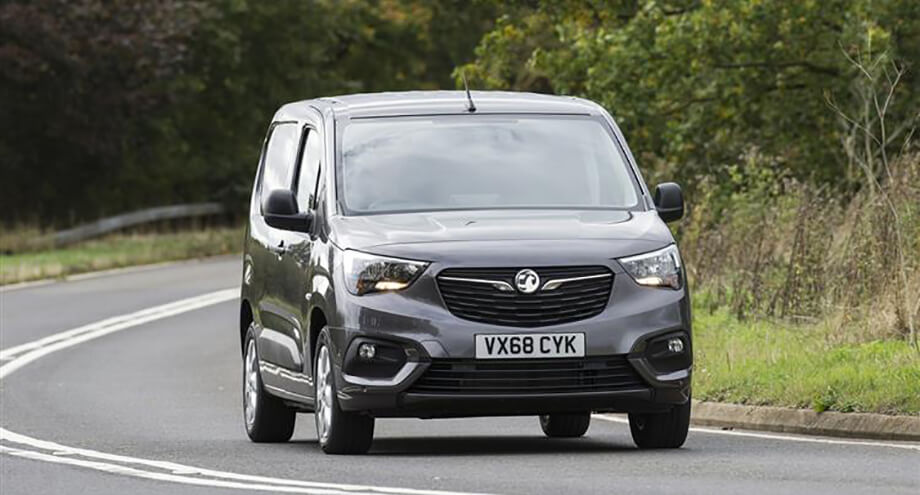Vauxhall Corsa Van Review and Specs
If you need a city van but don't like the way that most small vans drive, you probably need a Vauxhall Corsavan. Jonathan Crouch looks at the latest version.
Ten Second Review of the Vauxhall Corsavan
Having engineered their fourth generation Corsa supermini, Vauxhall has also brought us the latest version of that model's small LCV derivative, the Corsavan. This one has a redesigned cabin, smarter styling and its supermini stablemates more efficient mechanicals and more dynamic handling. This all puts it in a formidable position if you're looking for a small van but hate driving small vans. This one drives like a car but can still lug 0.92m3 and has a payload of up to 571kg.
Background to the Vauxhall Corsavan
Want to know the key thing that has changed the van market immeasurably for the better? The rise of the owner-operator. Time was when you just drove the van that your company provided you with. Yes, there would always be sales to a few self-employed tradespeople who would buy their own set of wheels, but by and large - and this is the critical point - those who chose and bought commercial vehicles were very rarely tasked with driving the things. That meant real lowest common denominator vehicles that were horrible to drive but, most importantly, cheap to buy and run. These days you can have your cake and eat it too. Van manufacturers have realised they needed to up their respective games and nowhere has the competition become hotter than in the cityvan market. If you want the utility of a van but the driving manners of a car, Vauxhall's Corsavan needs to be one of your first ports of call.
Driving Experience of the Vauxhall Corsavan
As you might expect from a car that has had its side windows replaced with metal, the Corsavan drives quite similarly to the standard-issue Corsa hatchback. In case you weren't clued in, this means it drives very well indeed. The Corsa's had a refresh of late and the suspension system has been given a good once-over. The van will ride a little stiffer than the hatch, due to a class-leading payload of 571kg. The engines include a 70PS 1.2-litre petrol version that acts as a budget entry-level variant, then beyond that there are 75 and 95PS versions of the 1.3-litre CDTi diesel, both fitted with start/stop to stretch fuel economy a bit further in town. All versions drive the front wheels via a manual gearbox, which is where Vauxhall is maybe missing a trick on such an urban-oriented vehicle. Something not requiring so much left leg action would be a welcome addition to the range. As you would expect, the driving environment is also on a par with that the of the Corsa supermini and now gets that model's pair of much-improved front seats. A fuel-sipping ecoFLEX version is also available, but this gets a five-speed gearbox which blunts performance compared to the six-speeders on the other diesel versions.
Design and Build of the Vauxhall Corsavan
Hot hatch - or business tool? You don't expect a van - any van - to look this sporty. Such, though, are the benefits in design of not having to worry about incorporating a boxy load space out back. It does look pretty slick, especially in racy Sportive trim. This gets a leather trimmed steering wheel, sports seats and piano black dash inserts and can be identified externally by the 16-inch alloy wheels, front fog lights, body-coloured door handles and LED daytime running lights. Inside the Corsa cabin, it's a lot nicer than you'd probably expect a van to be, with evidence of the kind of soft-touch materials that supermini car buyers now increasingly expect. But this also remains a sturdily-built contender, with chunky controls and durable materials that should cope with all the dust, dirt, rough treatment and spilt tea that typical LCV drivers can dish out. At the wheel, everything falls easily to hand and it's easy to get comfortable.
Market and Model of the Vauxhall Corsavan
Prices, as you'd expect, are very comparable with those of this model's closest rival, the Ford Fiestavan. The figures open at around £11,000 excluding VAT for the 1.2-litre version. Step up to the 75PS 1.3 CDTi and you're looking at just over £12,000, while the 95PS ecoFLEX version will give you a bit of change from £13,000.The range-topping 1.3 CDTi Sportive is yours for well under £14,000. Equipment levels are reasonably generous for a van, Vauxhall probably reasoning that stripping kit out of a Corsa supermini would probably create a greater incremental cost than just leaving it there in the first place. Therefore even the entry-level Corsavan gets Bluetooth, USB, an AUX-in connection, six airbags, electric windows, daytime running lights, a tyre pressure monitoring system, stability control, a digital radio and steering wheel-mounted audio controls. Step up to the Sportive version and you get a ritzier interior finish, but buyers also receive a heated windscreen, rain-sensing wipers, automatic lights, cruise control, a height adjuster for the driver's seat and air conditioning. Factor in the alloy wheels, six-speed transmission and body addenda and that's not a bad haul for an extra £1,000 over the ecoFLEX. Do bear in mind though that you only get a space saver in the Sportive version, where the standard Corsavan gets a full-sized spare. The IntelliLink touch-screen multimedia system is a £750 option.
Practicalities and Costs of the Vauxhall Corsavan
As for running costs, well even the petrol-engined model is powered by a modern downsized engine of formidable efficiency, returning 51.4mpg on the combined cycle, 40.9mpg around town and it'll log emissions of 128g/km. Most will go for a diesel and the best of these is the ecoFLEX version, which averages 83.1mpg, will still get a claimed 72.4mpg in town and is the only Corsavan with sub-100g/km emissions, in this instance 90g/km. The other diesels just miss out on dipping under the tonne, the 75PS version registering 102g/km and the 95PS Sportive being hardly any worse at 103g/km.
Summary of the Vauxhall Corsavan
The Corsavan's clearly not going to have things its own way. As before, this generation version is primarily going to have to overcome the appeal of its arch-rival, Ford's Fiestavan, if it wants to win the hearts and minds of urban business operators. Still, this little LCV is better equipped to do that now than it ever was before. It's now big enough for the requirements of most typical operators and the payload increase of this generation version will make a significant difference to some users. On top of that, the pricing is competitive and efficiency is exemplary. Plus this Vauxhall really hammers home its advantage with what is probably the nicest driving environment in the segment, especially if you opt for the top Sportive version. That model also happens to be the nicest to drive, courtesy of a 95PS diesel engine and a six-speed manual gearbox. Overall then, this Vauxhall represents a strong all-round package if you need a van that's intentionally small and nippy. It now sets the standard for supermini-derived LCVs of this sort.

